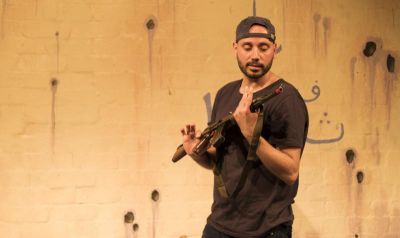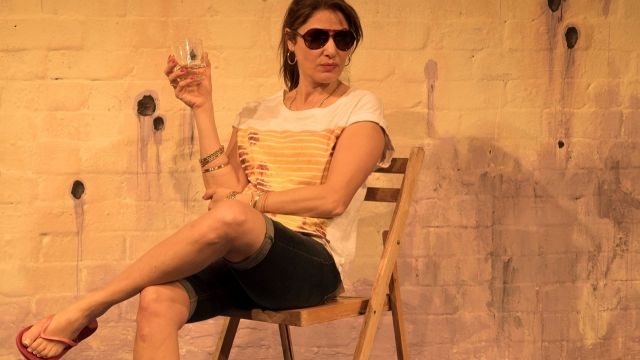Beirut Adrenaline
On the opening night of Beirut Adrenaline, a play about the Lebanon war in the 1980s, a speaker from the Australian Lebanese Historical Society gave an introductory talk. She spoke about the play’s resonance for Lebanese Australians, many of whom migrated here during this civil war. Her speech immediately put the play in an Australian context and highlighted the direct links with our lives today. The potential is clear.
Beirut Adrenaline was written in French ten years ago, staged in France and Lebanon, and has now been translated into English by Sydney’s Théâtre Excentrique. The play has personal meaning for the company’s artistic director Anna Jahjah, who like some of the characters, fled Lebanon for France. She is the translator (along with Kris Shalvey) and the director too.
Zyad (Eli Saad) and his sister Mona (Sana’a Shaik) may have got out of Lebanon but they haven’t escaped the war. In many ways, their brother Marwan (also Saad) is more resilient even though he is stuck in Beirut. He finds tender moments of humanity as he connects with his neighbour Rima (Neveen Hanna) in the face of their country’s decline.

The subject of this play is fascinating and its themes ripe for drama but it falls short. There is not much of a plot, nor enough character development – we get a broad sense of who these people are but not what motivates them. We do not find out what they live for.
Saad and Hanna give strong performances and manage to capture pathos – their characters living with a sense of normality and mundaneness despite their overwhelming difficulties. The most touching moment is when they dance together, creating a sense of what could have been (or indeed could still be).
Hanna’s portrayal of Rima is touching. Her fiancé is missing and her young brother Toufic (a promising Mansoor Noor) becoming more and more angry and erratic but she remains strong. Her character is the vigorous heart of this play.

The cast is clearly talented but some acting is patchy. The production will strengthen significantly as their performances tighten.
Jahjah and Shalvey’s translation is clear and the staging is effective. From the balconies of their apartments – two rectangles on the stage floor – these two Beirut families can only connect from a distance. There is a sense of claustrophobia and entrapment.
Beirut Adrenaline is the perfect type of play to be staged at the downstairs theatre at Belvoir Street, which has often been dormant recently. Plays like this can attract new audiences but this one, in particular, needs development to reach its potential.
Peter Gotting
Subscribe to our E-Newsletter, buy our latest print edition or find a Performing Arts book at Book Nook.

